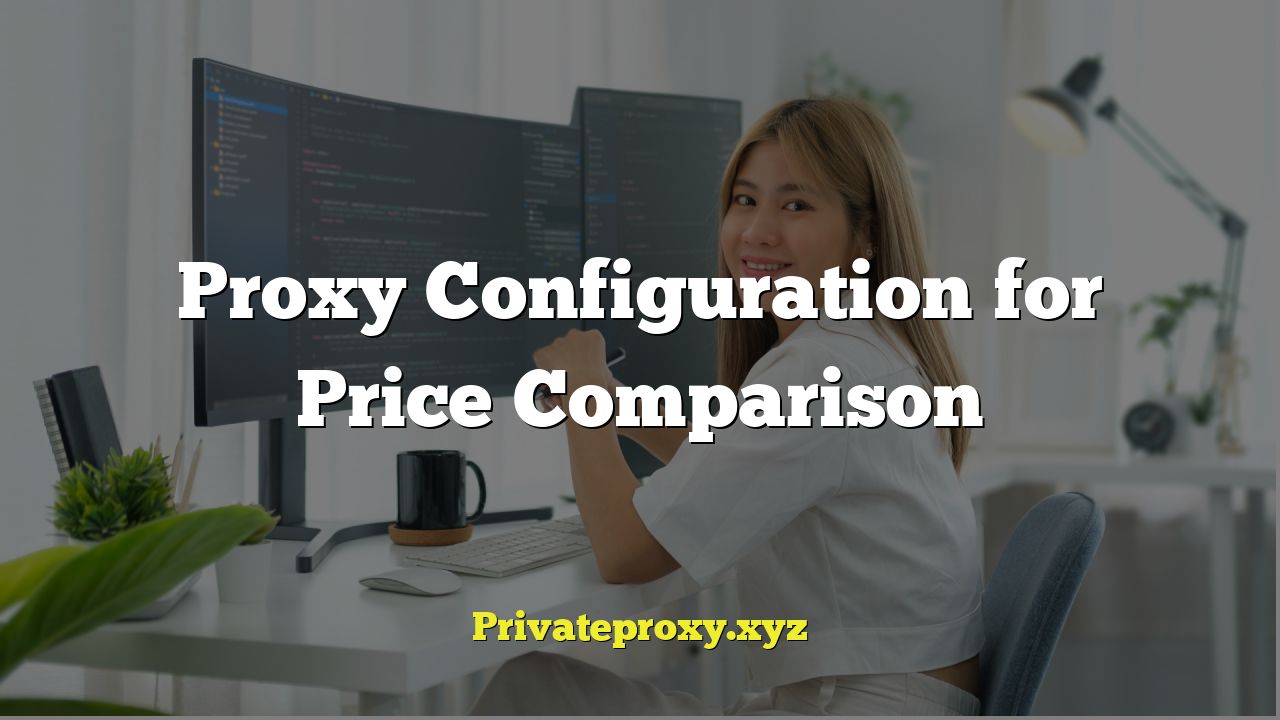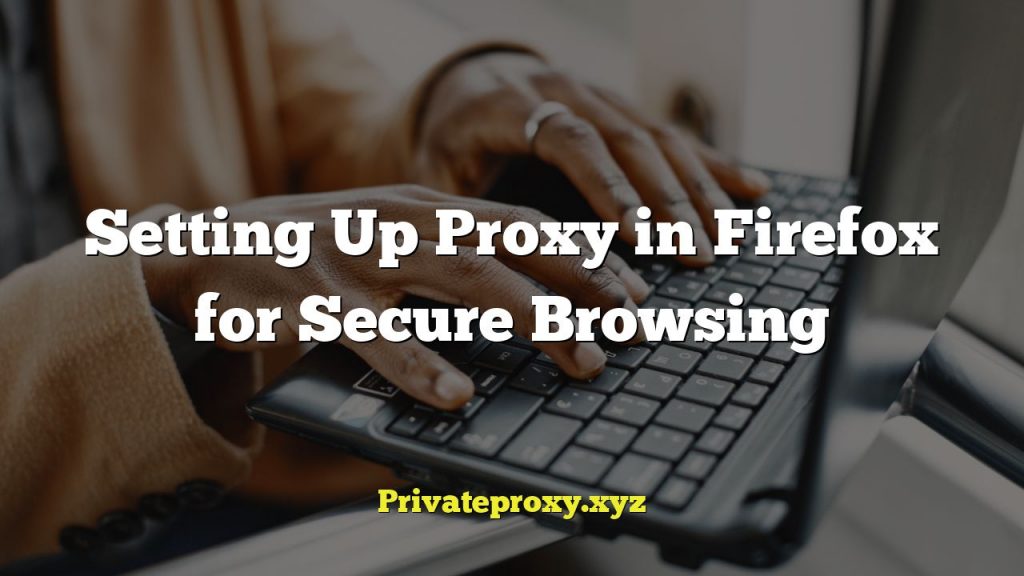
Introduction to Price Comparison and the Need for Proxies
In today’s competitive market, consumers and businesses alike are constantly seeking the best possible deals. Price comparison websites and tools have emerged as invaluable resources, allowing users to quickly and efficiently scan multiple retailers and vendors to identify the lowest prices on a desired product or service. However, the process of price comparison, particularly at scale, presents significant technical challenges. One of the most critical challenges is navigating the anti-scraping mechanisms employed by many e-commerce websites. These mechanisms are designed to prevent automated bots and scripts from overwhelming their servers and stealing valuable pricing data. This is where proxy configuration becomes essential.
Without proper proxy configuration, price comparison efforts are often thwarted by IP address blocking, rate limiting, and other techniques designed to detect and prevent automated data extraction. Proxies act as intermediaries between the price comparison tool and the target websites, masking the origin IP address and making it appear as though requests are coming from multiple different locations. This helps to circumvent anti-scraping measures and allows for the successful extraction of pricing data. In essence, proxies are the key to unlocking accurate and comprehensive price comparisons.
Understanding Proxy Types and Their Suitability
Not all proxies are created equal. Different types of proxies offer varying levels of anonymity, speed, and reliability. Choosing the right proxy type is crucial for successful price comparison. Here’s an overview of the most common proxy types:
- Dedicated Proxies: These proxies are assigned to a single user, offering the highest level of anonymity and performance. They are ideal for tasks that require consistent and reliable access to target websites. Because you are the only user, you avoid the risk of your IP address being flagged for malicious activity by other users sharing the same proxy.
- Shared Proxies: Shared proxies are used by multiple users simultaneously. While they are more affordable than dedicated proxies, they also come with potential drawbacks, such as slower speeds and a higher risk of being blocked due to the actions of other users.
- Residential Proxies: Residential proxies use IP addresses assigned to actual residential internet service providers (ISPs). This makes them appear more like legitimate users and less likely to be detected as bots. They are generally considered more reliable for bypassing anti-scraping measures.
- Datacenter Proxies: Datacenter proxies originate from data centers, which are known for hosting servers and other online infrastructure. While they are typically faster and more affordable than residential proxies, they are also easier to detect as non-human traffic.
- Rotating Proxies: These proxies automatically rotate through a pool of IP addresses, further masking the origin of requests and making it even more difficult to detect automated scraping. Rotation can be timed or triggered based on specific events.
The selection of proxy type depends on the specific needs of the price comparison project. Factors to consider include the target website’s anti-scraping policies, the required speed and reliability, and the budget available for proxy services.
Configuring Proxies for Price Comparison Tools
Configuring proxies for price comparison tools involves setting up the tool to route requests through the proxy server instead of directly connecting to the target website. The specific steps for configuration vary depending on the price comparison tool being used, but the general process remains the same. Typically, you will need the following information:
- Proxy IP Address: The IP address of the proxy server.
- Proxy Port: The port number that the proxy server uses to listen for incoming connections.
- Proxy Username (if required): The username for authenticating with the proxy server.
- Proxy Password (if required): The password for authenticating with the proxy server.
Most price comparison tools allow you to configure proxy settings within their settings or configuration files. Look for options related to “proxy,” “network,” or “connection.” You will typically need to enter the proxy IP address and port number, and optionally the username and password if required. Some tools may also allow you to specify different proxies for different target websites or tasks. It’s important to test the proxy configuration after setting it up to ensure that it is working correctly.
Best Practices for Proxy Management in Price Comparison
Effective proxy management is crucial for ensuring the long-term success of price comparison efforts. Here are some best practices to follow:
- Monitor Proxy Performance: Regularly monitor the performance of your proxies to identify any issues such as slow speeds, frequent disconnections, or blocking. This allows you to proactively address problems and maintain reliable access to pricing data.
- Rotate Proxies Regularly: Implement a proxy rotation strategy to minimize the risk of IP address blocking. The frequency of rotation should be adjusted based on the target website’s anti-scraping policies and the intensity of the price comparison activity.
- Use a Proxy Manager: Consider using a proxy manager tool to automate the process of proxy selection, rotation, and monitoring. These tools can simplify proxy management and improve the overall efficiency of your price comparison efforts.
Beyond these technical considerations, ethical practices are also vital. Respect robots.txt files, avoid overloading target servers, and consider contacting website owners for permission before scraping large amounts of data. Following these guidelines ensures sustainable and ethical price comparison activities.
Avoiding Common Proxy-Related Issues
Even with careful proxy configuration and management, you may still encounter issues. Here are some common problems and their solutions:
1. Proxy is Blocked: If a proxy is blocked, try rotating to a different proxy from your pool. If the issue persists, consider switching to residential proxies or reducing the frequency of requests.
2. Slow Proxy Speed: Slow proxy speeds can significantly impact the performance of your price comparison tool. Try testing different proxies and choosing those with faster connection speeds. Consider upgrading to dedicated proxies for better performance.
3. Proxy Authentication Errors: Ensure that you are using the correct username and password for your proxy server. Double-check the credentials and try re-entering them. If the problem persists, contact your proxy provider for assistance.
4. CAPTCHAs: Frequent CAPTCHAs indicate that your traffic is being flagged as suspicious. Try using residential proxies, rotating proxies more frequently, and implementing CAPTCHA solving services.
By proactively addressing these common issues, you can minimize disruptions to your price comparison efforts and maintain reliable access to pricing data.
Advanced Techniques: Proxy Chaining and Geo-Targeting
For more sophisticated price comparison scenarios, advanced techniques such as proxy chaining and geo-targeting can be employed.
Proxy Chaining: This involves routing requests through multiple proxy servers in a sequence. This further obfuscates the origin of the requests and makes it even more difficult to track back to the original source. However, it can also increase latency and slow down the process.
Geo-Targeting: This allows you to select proxies from specific geographic locations. This is useful for price comparison scenarios where pricing varies by region or country. For example, you might want to compare prices for a product in the United States, Europe, and Asia. Geo-targeting enables you to access pricing data specific to each region.
These advanced techniques require more complex configuration and management, but they can provide significant benefits in certain price comparison scenarios. They enable you to obtain information as if you are accessing it from different parts of the world, which can be useful for uncovering regional pricing differences.
The Future of Proxies in Price Comparison
The landscape of online price comparison is constantly evolving. As e-commerce websites continue to implement more sophisticated anti-scraping measures, the need for robust and reliable proxy solutions will only increase. We can expect to see further advancements in proxy technology, such as more intelligent proxy rotation algorithms, improved residential proxy networks, and more sophisticated CAPTCHA solving services. The future will likely involve AI-powered solutions that can adapt to changing website defenses in real time.
Furthermore, the ethical considerations surrounding price comparison and data scraping will continue to be a topic of debate. Striking a balance between accessing valuable pricing data and respecting the rights of website owners will be crucial. This will require responsible use of proxies and adherence to ethical scraping practices.
Conclusion: Proxies as an Essential Tool
In conclusion, proxies are an essential tool for successful price comparison in today’s online environment. By masking the origin IP address and circumventing anti-scraping measures, proxies enable price comparison tools to access accurate and comprehensive pricing data from multiple sources. Choosing the right proxy type, configuring proxies properly, and implementing effective proxy management practices are crucial for maximizing the benefits of proxies and ensuring the long-term success of price comparison efforts. As technology evolves, the role of proxies in price comparison will only become more important, making them an indispensable asset for consumers and businesses alike.


